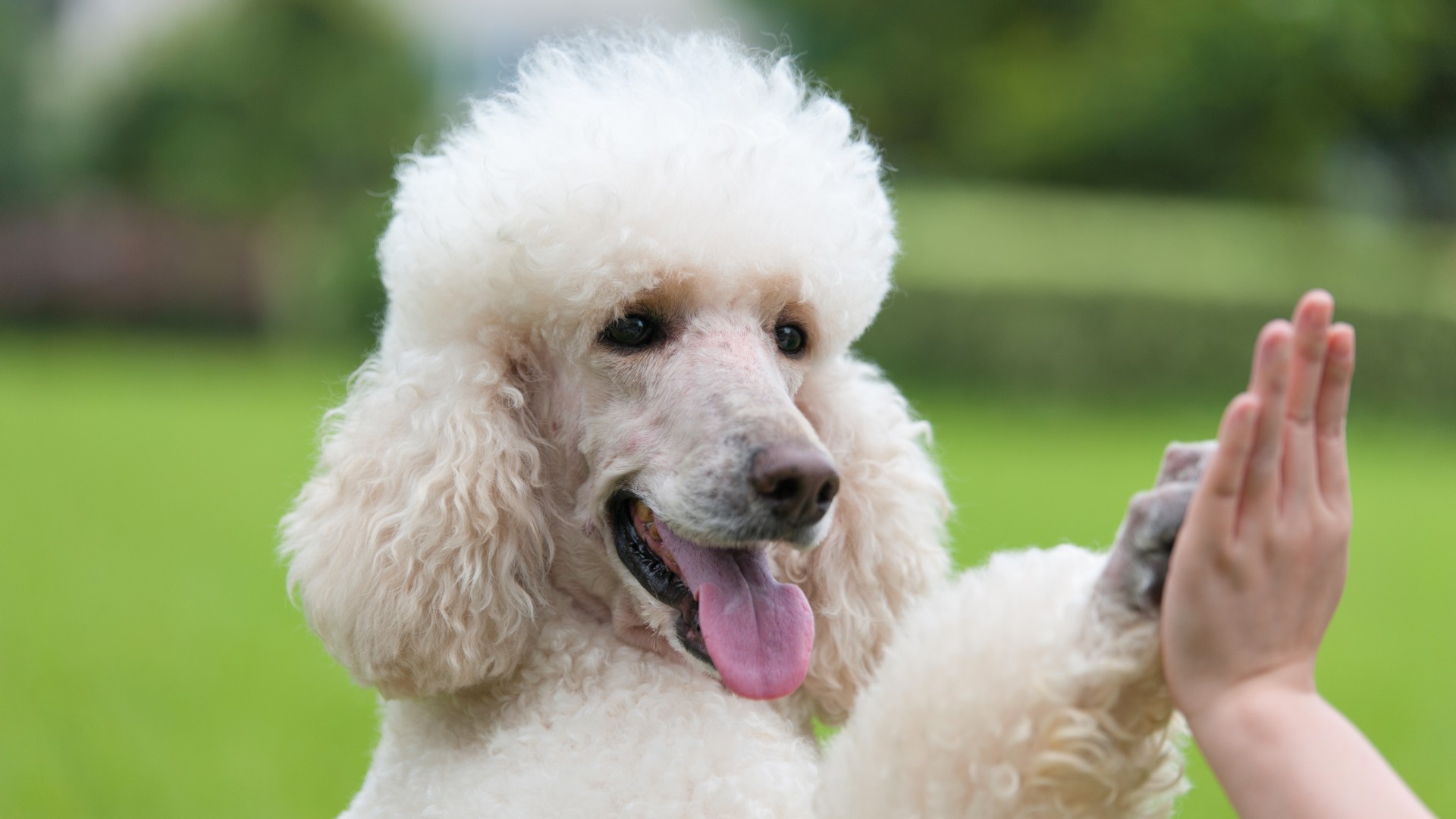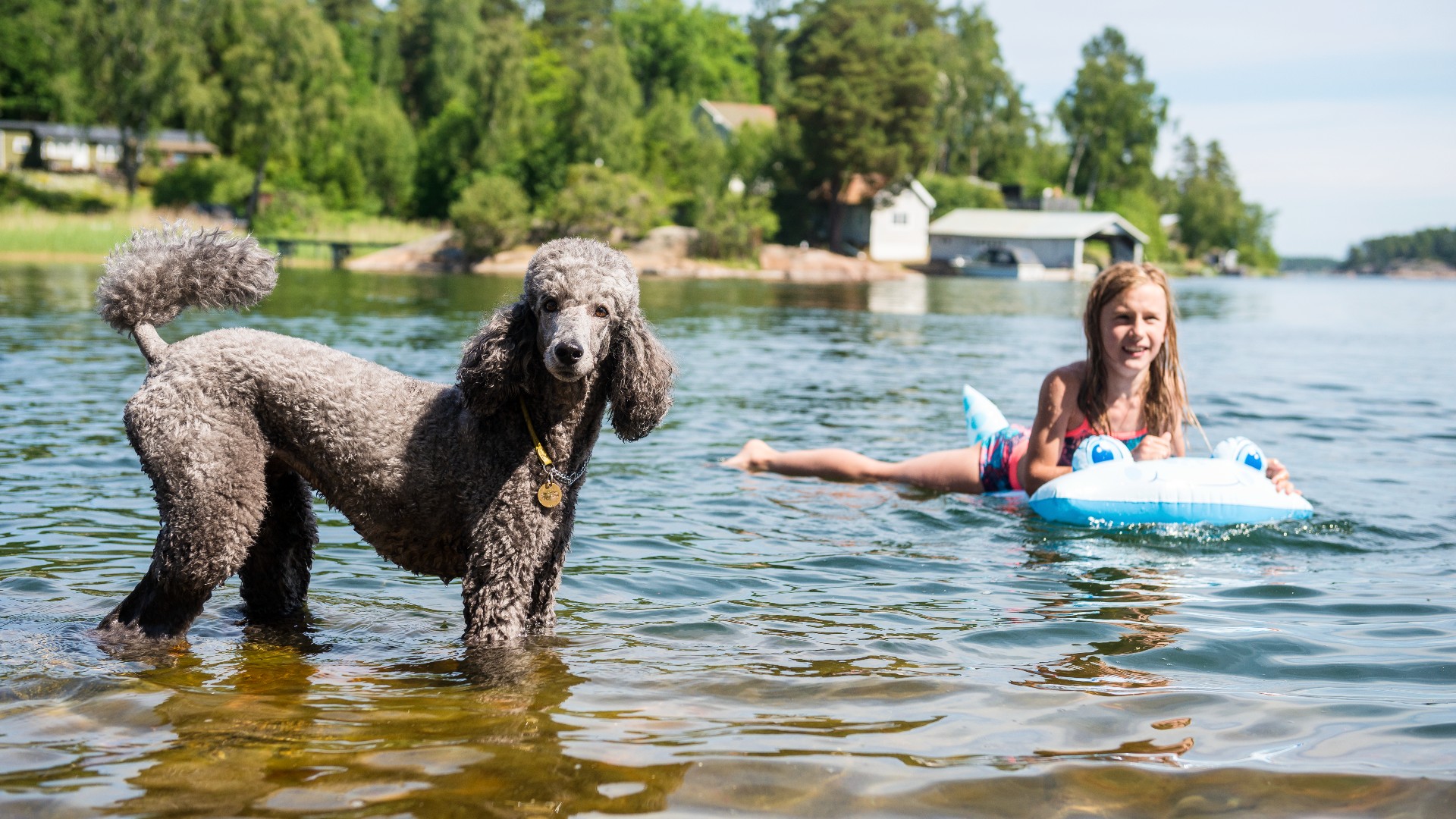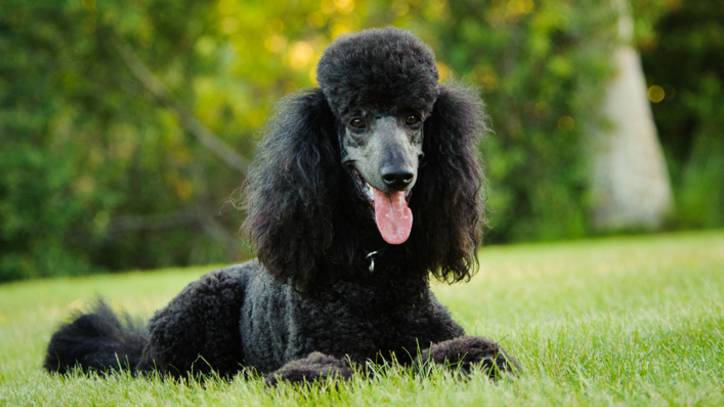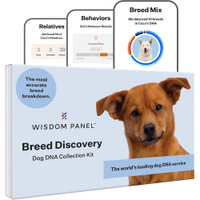Poodle: Breed profile
Overflowing with intelligence, the Poodle is a dream to train and makes a great fun-loving companion for active individuals and families

Poodles are not only beautiful, regal-looking dogs, they also have the brains to match. Developed in Germany, Poodles were originally bred as a water retriever for duck hunters which is why they are so lively. There are also three varieties: Standard, Miniature and Toy, the prime difference being their size.
Nowadays, Poodles are more likely to be entered into a dog show than retrieve game from a body of water. They also make for loyal companions. As a result, they are one of the most popular dog breeds and, while they do need a lot of attention (particularly when it comes to grooming as we will see), owners see a good return on their investment of time and energy. Poodles can certainly learn a trick or two.
In this guide, we're going to look at what makes a Poodle tick and how much effort you are going to need to put into these mischievous dogs, regardless of which variety you choose. It's also worth considering mix-breeds such as a Bernedoodle or a Labradoodle – dogs that benefit from a Poodle's smashing personality.
How much exercise does a Poodle need?
Life expectancy: 12 - 15 years
Average weight: Male: 70lbs/32kg Female: 60lbs/27kg
About the same as: a microwave oven
Poodles are very active dogs and they need regular exercise to ensure they are burning off their excess energy otherwise they may start to become restless and misbehave. Be prepared to walk an adult Poodle for at least 30 minutes and up to an hour each day. They will love your company, stay fit and become mentally stimulated too.
It's also a good idea to invest in the best dog toys and maybe play a game of fetch or hide-and-seek with some tasty treats. A good way to keep them moving is to train them using an agility course. Poodles also love to retrieve and, if there is a body of water around, let them go for a swim.
Are Poodles easy to train?
Suitable for: Anyone who wants a super intelligent dog
Not suitable for: Anyone who hates the thought of regular grooming
Temperament: Intelligent, trainable, active
Shedding: Low
There is one thing we can say with great certainty: you are not going to have many problems training a Poodle. In fact, they are among the easiest to train breeds, primarily because they are so intelligent. According to canine psychology professor Stanley Coren – whose book Intelligence of Dogs remains highly regarded – Poodles are the second brightest dog after Border Collies. To be labeled as such, a breed needs to be able to understand new commands in fewer than five repetitions and obey the first command at least 95 percent of the time.
Helping matters enormously is a Poodle's loyalty and willingness to please their owners. They actually appear to enjoy a training session and seem to thrive on learning new things. As such, the only real issue you're going to have is keeping a Poodle's mind and body ticking over. They can easily become bored and that's a big danger because they can then become destructive. Head off problems to some extent by being firm and consistent while teaching your Poodle boundaries. That way bad behavior is less likely to surface.
Are Poodles good with kids?

Poodles are wonderful family pets. Not only do they show great affection, but they are also able to learn fun tricks that are sure to excite and enthrall young human minds. This breed is also known for being gentle and they can more than match a child's energy levels which makes them great playmates. It helps that they are patient too, but, as with all dogs, you should be wary about letting kids mix without supervision. You should also teach children not to be rough and to respect dogs: you don't want to risk a Poodle getting injured.
What do Poodles eat?
How much you feed a Poodle will depend on which type you have. As we've already mentioned, there are standard, miniature and toy varieties – toy Poodles being the smallest. For toy Poodles, a quarter to half a cup of the best dry dog food daily spread over a couple of meals will suffice. You should step this up to three-quarters to a full cup for miniatures and between one-and-a-half to three cups for standards.
It's worth considering special formulations for Poodles such as the Royal Canin Poodle dry dog food for adults. You can also give them treats but don't overdo this in training – Poodles will respond well enough without you having to pop something in their mouth afterward.
Do Poodles bark a lot?
Poodles are considered to be moderate barkers. They'll generally only make a noise if they want to warn you of a stranger approaching your home or if they are bored, frightened, or excited. It's important to give them tasks and keep their mind occupied and, if they are barking excessively, identify the trigger. Don't tell them not to bark - instead, encourage them through treats and praise them when they stop. And bear in mind that Toy Poodles take less well to being left home alone for long periods of time and that separation anxiety can cause barking too.
Are Poodles aggressive?

As long as you teach a Poodle how to behave and properly socialize them from a very early age, then you'll find this breed is rather gentle. At least, that tends to be the experience of owners. That said, they are protective of their family and home. What's more, researchers from the University of Helsinki in May 2021 also said Poodles had the highest odds of aggressive behavior towards strangers, which meant the breed came second in their list of most aggressive dogs.
“In our dataset, the Long-Haired Collie, Poodle (Toy, Miniature and Medium) and Miniature Schnauzer were the most aggressive breeds,” says Professor Hannes Lohi. Much depends, he added, on the experience of the dog owner.
Do Poodles shed a lot?
Amount Of Shedding: Low
Easy To Groom: No
General Health: Good
Potential For Weight Gain: Low
No. Poodles are very low-shedding dogs and they are also among a good number of hypoallergenic dog breeds that should help with the sniffles. But they are not easy to groom. Their coat can become matted and tangled and you need to keep on top of it using the best dog brushes. Regularly brush and bathe a Poodle, by all means, but consider taking the breed to a professional groomer at least once a month. Yes, it can get expensive, but we promise it will make your life a lot easier!
Wisdom Panel Breed Discovery DNA Kit | Amazon
Not sure exactly what breed your dog is? This kit screens for 365+ breeds – because knowing every detail about your dog helps you understand how best to care for them.
Poodle health problems
Poodles are generally healthy dogs and they don't have many issues. This is reflected in their long lifespan – you can expect them to live between 12 and 15 years. Watch out for bloat which particularly affects Standard Poodles – they are among the most at-risk breeds for Gastric Dilation-Volvulus. And if you are finding your pooch has a reduced appetite, is shaking, vomiting or lethargic, seek help: it could be Addison's Disease which is also common in Poodles. Hip dysplasia, epilepsy and an underactive thyroid gland are also concerns. Buy the best pet insurance (and understand how pet insurance works) to ensure you're at least financially covered for any problems.
Should I get a Poodle?
Whether or not you should get a Poodle depends on the amount of time you have. Poodles love attention, need to be kept stimulated and require a lot of grooming. Yet you won't need to spend an age training them and their intelligence is astounding – you will have a lot of fun getting to know a Poodle. Just be aware that owning a Poodle isn't cheap: A Standard Poodle could cost you thousands of dollars a year when you factor in food and grooming - not to mention any trips to the vet!
Want to learn more about the breed? Here are our favorite poodle facts and 32 reasons to love poodles
PetsRadar Newsletter
Get the best advice, tips and top tech for your beloved Pets

David Crookes has been a journalist for almost 30 years and he has written for a host of magazines, newspapers, websites and books including the World of Animals Annual, BBC Earth, Live Science, The Independent and Tom’s Guide.
Born in England, he lives with two cats but he’s also keenly interested in the differences between the huge number of dog breeds – in fact, you can read many of his breed guides that he’s written in collaboration with vets here on PetsRadar.
With a lifelong passion for technology, too, he’s always on the lookout for useful devices that will allow people to keep their pets happier and healthier, and provide them more time to spend together.
David has a degree from Durham University, as well as postgraduate diploma in journalism from the University of Central Lancashire.

